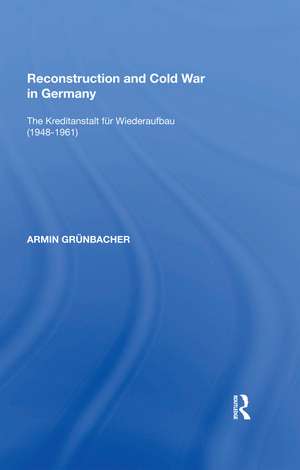Reconstruction and Cold War in Germany: The Kreditanstalt f�r Wiederaufbau (1948�1961)
Autor Armin Grünbacheren Limba Engleză Paperback – 14 aug 2020
Preț: 261.95 lei
Preț vechi: 327.52 lei
-20% Nou
Puncte Express: 393
Preț estimativ în valută:
50.14€ • 54.48$ • 42.14£
50.14€ • 54.48$ • 42.14£
Carte tipărită la comandă
Livrare economică 21 aprilie-05 mai
Preluare comenzi: 021 569.72.76
Specificații
ISBN-13: 9780367593896
ISBN-10: 0367593890
Pagini: 296
Dimensiuni: 152 x 235 x 19 mm
Greutate: 0.55 kg
Ediția:1
Editura: Taylor & Francis
Colecția Routledge
Locul publicării:Oxford, United Kingdom
ISBN-10: 0367593890
Pagini: 296
Dimensiuni: 152 x 235 x 19 mm
Greutate: 0.55 kg
Ediția:1
Editura: Taylor & Francis
Colecția Routledge
Locul publicării:Oxford, United Kingdom
Cuprins
Contents: Introduction; Part 1 Setting The Scene: The Cold War developments and the political and economic situation in Germany 1947-48; The foundation of the Kreditanstalt and its first action; Task, senior staff, internal structure and ways of operations. Part 2 Raising Capital: American money: counterpart funds and ERP special assets; German money: improvisation and improvements. Part 3 'Guiding' The Economic Reconstruction: Agriculture; Basic industries; Housing construction. Part 4 Fighting The Cold War: Exports And Development Aid: Berlin, the Cold War's foremost front; Exports; Towards the development aid bank and beyond. Conclusion; Glossary of German financial, legal and economic terms; Bibliography; Index.
Descriere
The rapid onset of the Cold War ensured that the western powers needed to re-establish a strong West German state to act as a bulwark against Soviet influence. In this study the critical role of the Kreditanstalt für Wiederaufbau (KfW) in this process is closely examined.
